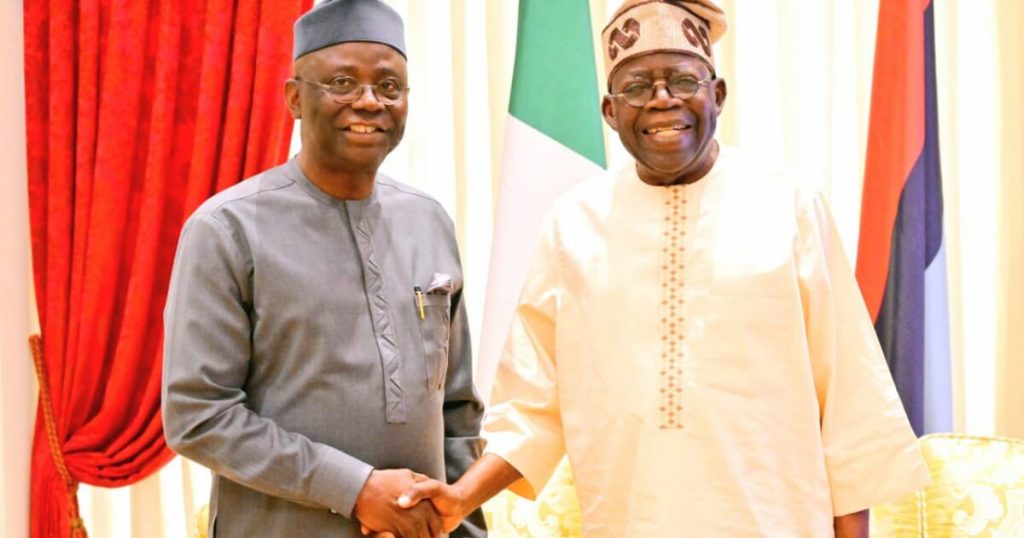Pastor Tunde Bakare’s meeting with President Bola Tinubu signifies a critical juncture in Nigeria’s political landscape, emphasizing the urgent need for unity and collaboration to address the nation’s multifaceted challenges. Bakare, a prominent religious leader and former presidential aspirant, has been a vocal critic of Tinubu’s administration, particularly concerning the economic hardships and security concerns plaguing the country. However, his recent visit to the President’s residence suggests a shift towards constructive engagement, prioritizing national interest over political differences. His call for collaboration between the “best of the North and the best of the South” underscores the importance of transcending regional divisions and forging a united front to tackle the pressing issues confronting Nigeria.
The backdrop of Bakare’s meeting is marked by a growing North-South divide, exacerbated by policy decisions perceived as favoring one region over the other. The resistance to the national livestock plan, the blockage of decentralized policing efforts, and the criticism of fuel subsidy removal and currency devaluation all point to a simmering discontent within the northern region. The Northern Elders Forum’s accusations of lopsided appointments and policy-making without northern input further highlight the perceived marginalization and the potential for political instability. This growing rift threatens to undermine national cohesion and hinder efforts to address critical challenges such as insecurity and economic hardship. Bakare’s appeal for collaboration aims to bridge this divide and foster a sense of shared responsibility for the nation’s future.
Prior to his meeting with President Tinubu, Pastor Bakare had been a staunch critic of the government’s policies, accusing the administration of engaging in a “motor-park brand of politics” and driving the nation towards tyranny. He specifically criticized the economic policies, including fuel subsidy removal and naira devaluation, for inflicting hardship on citizens and potentially triggering a popular uprising. He lamented the lack of humility and character among political leaders, emphasizing the need for a more responsive and compassionate approach to governance. His Easter State-of-the-Nation address served as a stark warning against the dangers of ignoring the growing discontent and the potential consequences of unchecked political maneuvering.
However, following his private meeting with President Tinubu, Bakare adopted a more conciliatory tone, emphasizing the cordial nature of their discussion and expressing confidence in the President’s receptiveness to his suggestions. While refraining from divulging the specifics of their conversation, Bakare emphasized his commitment to seeing a functional and prosperous Nigeria within his lifetime. This shift in tone suggests a willingness to engage in constructive dialogue and collaborate with the government to find solutions to the nation’s challenges. His decision to keep the details of their conversation private indicates a desire to avoid escalating tensions and to allow the President the space to consider and implement the proposed solutions.
Bakare’s call for collaboration between the North and South highlights the crucial role of elite consensus in navigating the complex political landscape of Nigeria. The nation’s history has been marked by regional and ethnic tensions, often exploited for political gain. Building a strong and united nation requires a concerted effort from leaders across all divides to prioritize common ground and work towards shared goals. Bakare’s emphasis on collaboration reflects the understanding that sustainable solutions to Nigeria’s challenges cannot be achieved through unilateral action or regional dominance. It requires a collective effort, drawing on the expertise and perspectives of leaders from all parts of the country.
Ultimately, the success of this call for collaboration rests on the willingness of political leaders, particularly President Tinubu, to embrace inclusive governance and address the concerns of all regions. The President’s response to Bakare’s suggestions, and his subsequent actions, will be crucial in determining the trajectory of the nation. The hope is that this meeting will mark a turning point, fostering a spirit of unity and collaboration that will pave the way for a more stable, prosperous, and inclusive Nigeria. The challenges facing the nation are significant, but the potential for progress is immense if leaders can rise above partisan politics and work together for the common good.


